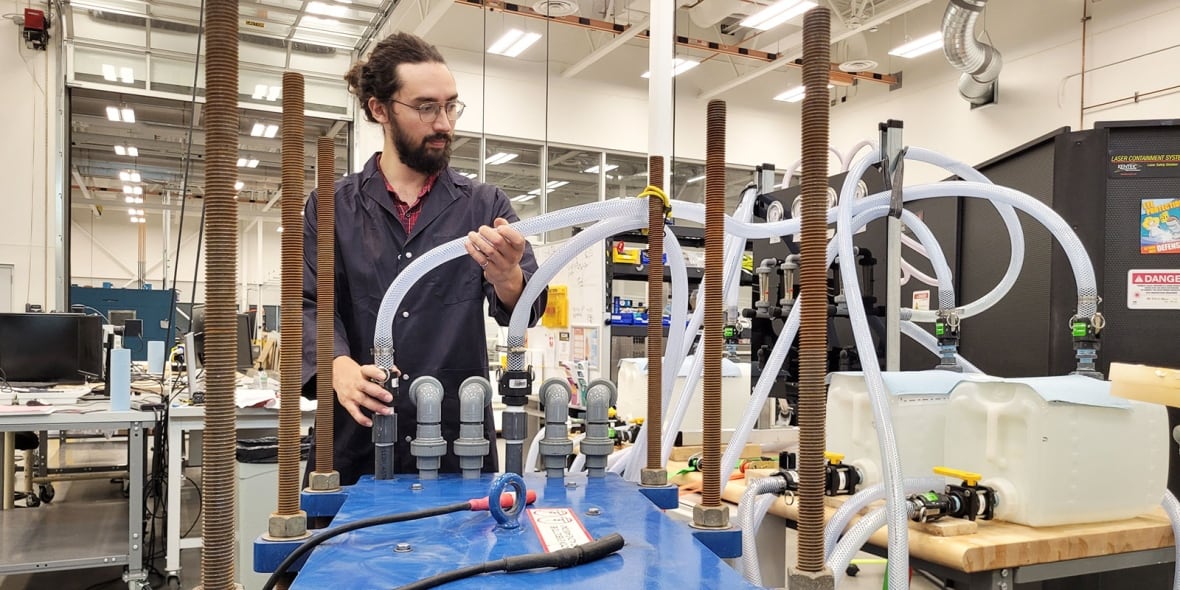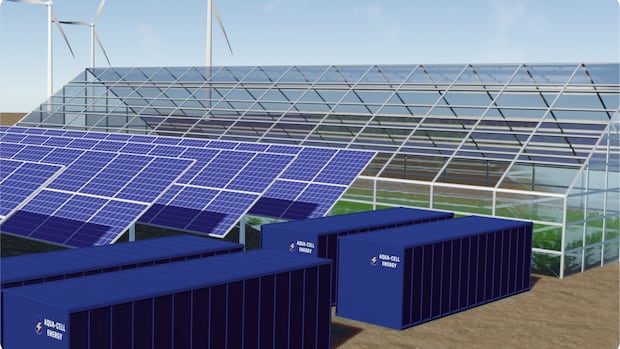An Edmonton-based startup is getting its first chance to test battery technology the City of Medicine Hat hopes will provide an alternative to expensive electrical grid upgrades.
Aqua-Cell Energy’s saltwater flow battery — the size of a shipping container — will be piloted in the southeast Alberta city starting in early 2026 as one of the winners of a Medicine Hat innovation competition.
The company’s CEO Keith Cleland said grid batteries are like the components of a vehicle in that they can either optimize power output or the length of time it can run.
“If you want a more powerful engine, you’d get a bigger engine — or in this case, a bigger battery stack,” Cleland told CBC News.
“If you want to store energy for longer periods of time, you get a bigger gas tank — or in our case, bigger saltwater tanks.”
Cleland, who was born and raised in Calgary, began researching saltwater battery technology during his undergraduate studies at the University of Waterloo.
He made it the focus of a master’s degree he started in 2019 at the same school and partnered with his now-chief technical officer Ellsworth Bell to create Aqua-Cell Energy through Waterloo’s startup incubator Velocity.
After returning to Alberta, Cleland partnered with the Northern Alberta Institute of Technology to improve and test his research.
Now as he scales up to see if the battery can work at a larger scale, Cleland hopes he can help build a part of Alberta’s energy future.
“It’s traditionally an energy-focused province so it’s great that we can bring clean energy technology that can help strengthen our electric grids,” he said.
‘Win-win’
The City of Medicine Hat launched its Energy Innovation Challenge with the goal of supporting the clean energy transition and diversifying Alberta’s energy economy.
The $2.4 million program helps to fund 50 per cent of six pilot projects over three years, with support from Prairies Economic Development Canada, the city, Decentralized Energy Canada, Emissions Reduction Alberta and various other parties.
Medicine Hat is the only city in Canada that owns its own energy production and distribution — a so-called micro-grid separate from Alberta’s larger provincial power grid.
Raymond Chokelal, a senior electrical engineer at the city, said that makes the area the perfect testbed for Aqua-Cell’s saltwater battery pilot.
“We wanted to see how it would do with the cold, with the hot, and tying into our grid, potentially offering the opportunity to implement this,” Chokelal said.
“We could deploy it around the city at various locations to help us with grid congestion.”
Battery could help solve problems
Medicine Hat’s energy business unit is facing financial headwinds that aren’t expected to get easier.
Its gas production division is no longer profitable due to the depletion of older natural gas wells and the costs associated with restoring disturbed land to the way it was before it was drilled, known as reclamation.
While the city’s electricity generation business is still profitable, it hasn’t been immune to a decline in Alberta power prices that followed record-breaking profits in 2023.
One of Medicine Hat’s most pressing concerns is aging infrastructure. An estimated $500 million will be required over the next decade just to sustain existing assets, not to mention further expansion.
Energy officials hope solutions like Aqua-Cell’s saltwater battery could help keep costs lower for the city and its residents.
“The idea of batteries is kind of to push off needing to upgrade our distribution and transmission system to accommodate the additional load. It’s a non-wires upgrade,” said Chokelal.
He called it a “win-win” that could both allow Aqua-Cell to prove it can scale and the city a way to save money.
Aqua-Cell’s pilot battery will be added to Medicine Hat’s electricity grid in early 2026, officials told CBC News.
Future resiliency
Anouk Kendall, president of Decentralised Energy Canada, said supporting entrepreneurs like Cleland and Ellsworth are crucial to create more resiliency with Canada’s energy grids at stake.
“We’ve just had the Brooks hail storm that took out a big swath of infrastructure, these are real things everybody in every community needs to understand,” Kendall said.

“They’re going to get worse, they’re going to get more regular, and if you can’t integrate your energy systems into the built environment, you’re way more vulnerable.”
Aqua-Cell’s saltwater battery could align well with Medicine Hat’s renewable energy transition goals as well, according to Cleland.
“The Gas City” — the official slogan for a municipality that has for over a century relied on oil and gas wells for its energy needs — is considering building what could at full scale be Canada’s largest solar farm.
It’s also exploring carbon capture technologies and other forms of renewable energy, projects that city officials say are necessary to ensure financial sustainability and compliance with federal regulations.
“The battery allows you to have that consistent solar power, so you don’t get any fluctuations or interruptions the energy supply,” Cleland said.
“And ultimately, it should result in lower costs for electricity users.”







